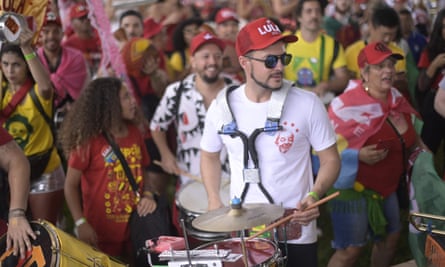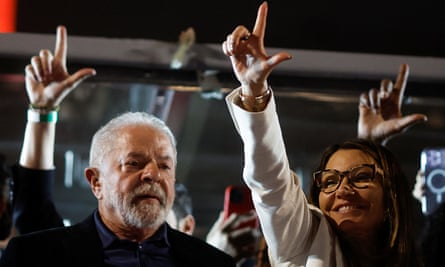Luiz Inácio Lula da Silva has vowed to haul Brazil out of Jair Bolsonaro’s era of “devastation”, barbarism and hate after being sworn in as the new president of Latin America’s largest democracy.
Addressing the National Congress in Brasília on Sunday afternoon, the veteran leftwinger, a former factory worker who was president from 2003 to 2010, celebrated the defeat of the far-right radical’s “authoritarian project” in October’s election, and promised to lead Brazil into a new chapter of environmental protection, social progress and “rational democratic” government.
“Democracy was the big winner in this election … Long live democracy! Love live the Brazilian people!” he told lawmakers to loud cheers.

Lula did not mention his right-wing predecessor by name in his 30-minute address. But he excoriated the damage done by Bolsonaro’s four-year administration during which nearly 700,000 Brazilians died of a mishandled Covid outbreak, millions were plunged into poverty, and Amazon deforestation soared.
The “criminal behaviour of a denialist and obscurantist government that treated people’s lives with callousness” during the coronavirus pandemic should not go unpunished, Lula told congress.
“Those who made mistakes will have to respond for those mistakes,” he declared, although he denied seeking revenge.
Minutes earlier, Lula had paraded towards the parliament building in a 1952 Rolls-Royce convertible, with thousands of security forces, including elite snipers, deployed to protect him from a potential assassination attempt. One man was reportedly arrested nearby carrying a fish knife and explosives. Fears of an attack grew on the eve of the inauguration when police arrested a pro-Bolsonaro radical who was allegedly plotting at the airport.
Huge crowds of ecstatic Lula supporters flooded the streets of Brazil’s capital to celebrate the sensational political revival of a man who just over three years ago was languishing in prison on corruption charges that were later annulled.
“We feel dizzyingly unfathomable relief,” said the journalist Arimatea Lafayette, 59, as red-clad revellers marched towards the congress building on Sunday morning to toast Lula’s return and the downfall of Bolsonaro, who flew to the US on Friday.

“We’ve been through four years of terror and now we feel free,” added Lafayette, who had flown in from the north-eastern state of Alagoas wearing a T-shirt stamped with Lula’s face.
Franceli Anjos, a 60-year-old feminist, had travelled 55 hours by road from the Amazon city of Santarém to witness the long-awaited end of Bolsonaro’s chaotic reign. “I’m convinced a new spring has arrived,” she said.
Lucas Rodrigues’s hands trembled with emotion as he described his delight at Lula’s sensational comeback, exactly 20 years after the former union leader became Brazil’s first working-class president in January 2003.
“The whole of Brazil is here – that’s what Lula’s capable of,” the 25-year-old said after stepping off a bus from the southern state of Santa Catarina, where he is part of the landless workers’ movement.
Lula’s American biographer John D French believed that after declaring war on hunger – a hallmark of Lula’s first government – the new president’s top priority would be reuniting a bitterly divided nation after a poisonous election campaign marred by violence.
“I think what he’d like would be a generalised reconciliation … and a standing down of the levels of conflict,” French said, although he warned that would be difficult given the toxic chasm between Lulistas and Bolsonaristas.
“The notion that everything is going to be roses and peaches and cream [is misguided]. I think this is going to be a very conflictual period.”
Bolsonaro boycotted the inauguration of a politician he describes as a communist “crook” and refused to pass the presidential sash to his successor, as is democratic tradition.
But the acting president, Hamilton Mourão, hinted at those divisions during a New Year’s Eve address in which he indirectly accused the rightwing radical of creating “an atmosphere of chaos and social breakdown” by refusing to recognise the election result.

“Alternation in power is healthy in a democracy and must be upheld,” Mourão declared, dashing the hopes of hardcore Bolsonaristas who have been calling for a coup to prevent Lula from taking over. As Lula was sworn in, hundreds of radicals remained camped outside Brasília’s army headquarters, demanding a military intervention.
Bolsonaro’s narrow defeat in October’s election – which he lost by 2m votes in a country of 214 million – sent a wave of relief over progressive Brazilians desperate to see the back of a man they accused of wrecking Brazil’s environment and place in the world.
French said that relief was reminiscent of Democrats’ reaction to Donald Trump’s 2020 demise. “[People were] like: ‘Phew, OK – now things can go back to normal.’
“But they didn’t go back to normal in the US. Nothing is normal politically. And it’s not going to return to some sort of placid normality [in Brazil, either].”
Still, the mere prospect of a fresh start under a progressive and inclusive Lula government – which has vowed to fight environmental crime and named an Indigenous woman to lead Brazil’s first-ever ministry for Indigenous people – has thrilled supporters who have flocked to the capital.
“I know it won’t be easy for Lula to rebuild everything that Bolsonarismo has destroyed. But I feel hopeful. If there’s anyone who enjoys the popular support and international respect from leaders around the planet needed to rebuild Brazil’s relationships with the world, it’s Lula,” said Diogo Virgílio Teixeira, a 41-year-old anthropologist from São Paulo.
As Lula spoke, hundreds of political leaders and social activists gathered to greet their leader at the presidential palace.
“This is a historic day,” said Douglas Belchior, a prominent civil rights activist who was part of Lula’s campaign. “It’s a feeling of duty fulfilled.”

 1 year ago
90
1 year ago
90










 English (US)
English (US)